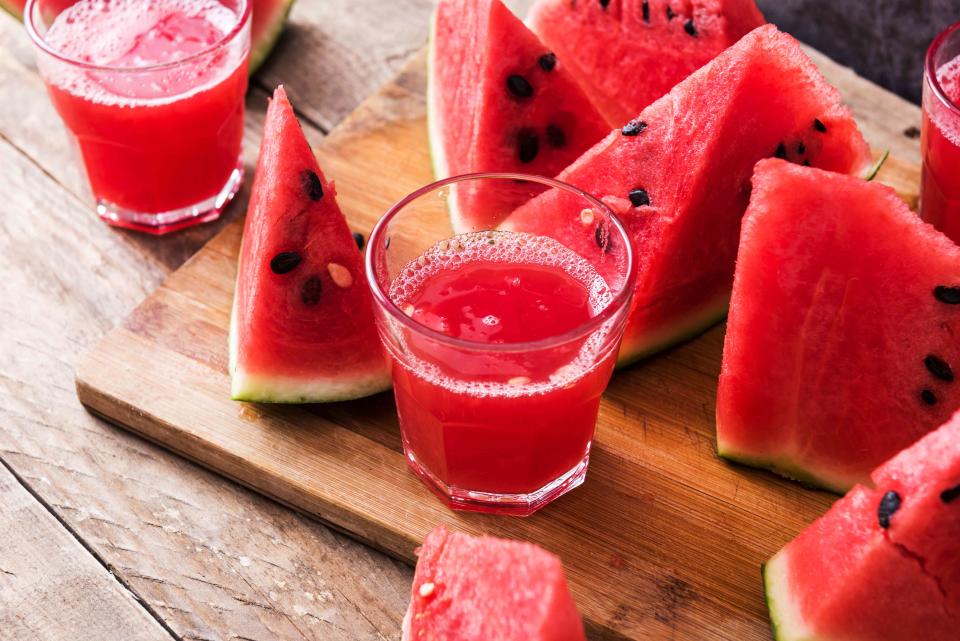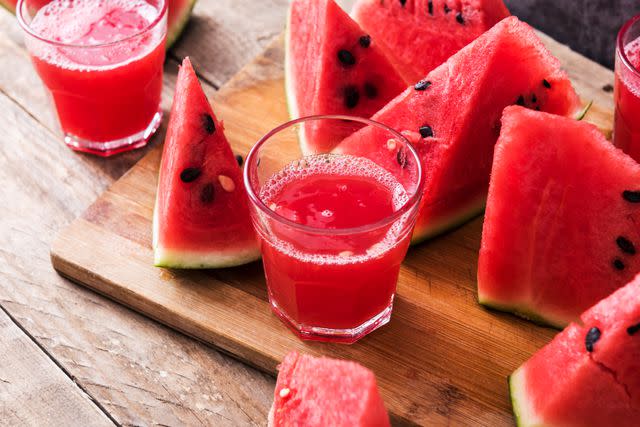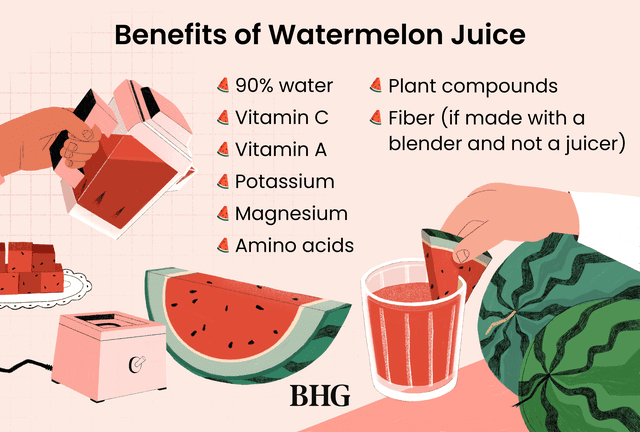Is Drinking Watermelon Juice as Good for You as Eating the Fruit Itself?
With some mindful considerations, drinking watermelon juice can be just as good for you as eating the fruit.

Summer—aka watermelon season—is officially here. While many typecast this juicy seasonal favorite as a special treat to indulge in after spending the day out in the sun, watermelon is actually full of nutrition. While there are many ways to enjoy the irresistible fruit, the latest trend is juice form—but is this popular juice fad actually good for you or just another sugar-laden health gimmick? Here’s what to know.
Related: 4 Watermelon Tricks for Finding One That's Perfectly Sweet and Juicy
Health Benefits of Watermelon
Watermelon is part of the Cucurbitaceae family, alongside cucumber, squash, and pumpkin. These beautiful pink fruits have archaeological evidence dating back over 5,000 years ago in Africa, and they’ve been a beloved fruit option all over the world for generations. While they taste delicious, watermelon’s nutritional value is also not to be overlooked. These are some of the most noteworthy nutrients you’ll receive by consuming this colorful fruit.

Water
Whether it's the name or the juices running down your chin that give it away, watermelon is a plentiful water source–with over 90% water content. Seeing that the body is made of mostly water, proper hydration is essential to keep all organ systems healthy, especially the kidneys. Water helps you maintain healthy blood pressure, regular digestion, and efficient detoxification systems.
Fiber
Watermelon provides you with a healthy source of fiber, especially if you eat the seeds. And while they might not be as tasty as the fruit itself, it’s worth it—fiber helps you maintain healthy digestion, lower cholesterol, and more effectively-regulated blood sugars.
Vitamin C
These melons are loaded with vitamin C. This important vitamin is known to boost the immune system, improve skin health, aid in the growth and development of tissues throughout the body, and assist in iron absorption.
Vitamin A
You’ll also find a substantial dose of vitamin A in watermelon. Similar to vitamin C, this nutrient is an inflammation-reducing antioxidant, boosting immune health. It also works to improve eye and skin health.
Potassium
In terms of minerals, watermelon contains modest amounts of potassium, an important electrolyte in the body, which helps maintain fluid balance and healthy blood pressure.
Magnesium
Eating this juicy fruit gives you a source of magnesium, which aids in energy production, muscle and nerve function, and can help support healthy sleep.
Amino Acids
One of the most noteworthy aspects of watermelon’s nutrition profile includes the amino acids citrulline and arginine: These building blocks of protein are two of the 20 amino acids that help form muscle, nerves, cells, and basically any other bodily structure. Studies show that the combination of these two amino acids in watermelon support healthy blood pressure and overall cardio-metabolic health.
Plant Compounds
Finally, watermelon boasts an impressive amount of plant compounds, including kaempferol, lycopene, and carotenoids. These bioactive compounds serve as antioxidants, bolstering the immune response and fighting off free radical molecules that can lead to a number of acute and chronic illnesses. Lycopene and carotenoids are also especially beneficial in maintaining eye health.
Related: 20 Fresh Watermelon Recipes to Satisfy Your Summer Cravings

BHG / Julie Bang
Is Watermelon Juice Good for You?
When comparing the benefits of drinking watermelon juice to consuming the whole fruit itself, there are a few factors to consider. First: How was the watermelon juice made? If a juicer was used (which separates the pulp from the juice), then you’ll get most of the nutrients listed above—with the exception of some fiber, as that is mostly left behind in the pulp.
If you use a blender to make your juice, you’ll be consuming the whole fruit along with all of its nutrition. However, this process breaks down some of the fiber, meaning your body will digest the juice faster than if you ate the whole fruit—resulting in a quicker rise in blood sugars. You’ll also likely drink much more watermelon than you would have eaten, causing you to potentially consume more sugar (though from a nutrient-rich, natural source), again impacting blood sugar levels. Despite these concerns, you’ll still be getting much of the fruit’s overall fiber benefits, along with its ability to help lower cholesterol levels.
You also want to think about if anything, namely sugar or any preservatives, have been added to your watermelon juice. Added sugar is a major pro-inflammatory agent that you generally want to avoid, as frequent consumption is linked to chronic illness and impaired gut health. While many of the preservatives you see in foods today are recognized as safe, some haven’t been around long, meaning there’s not much long-term research to fully understand their impact on our health.
Related: How to Cut a Watermelon 4 Ways So You Can Savor Summer's Best
Enjoying Watermelon Juice at Home
It’s undeniable that watermelon is good for us on so many levels, and while enjoying the fruit (and maybe even the seeds!) in its whole form is ideal, watermelon juice can also make for a healthy choice. Try making this refreshing beverage in a blender as opposed to a juicer, and avoid brands with added sugar or preservatives if you’re buying it at your local market. Enjoying watermelon in either the fruit or liquid form a few times per week is plenty to fully reap all of the health benefits it has to offer.
Related: How to Grow Watermelon That's Sweet and Juicy This Summer
For more Better Homes & Gardens news, make sure to sign up for our newsletter!
Read the original article on Better Homes & Gardens.

